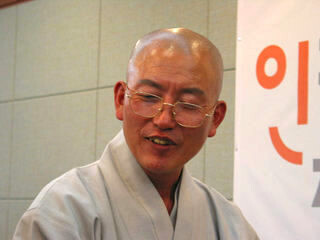hankyoreh
Links to other country sites 다른 나라 사이트 링크
Estranged from family after spy conviction, monk dies alone

On February 27, the body of a South Korean Buddhist monk was laid out prior to cremation. His Buddhist name had been Bogwang; his real name had been Lee Sang-cheol. Weeping next to the body was his youngest brother, Yeong-cheol (his name has been changed in this article).
The secular name of Lee Sang-cheol had been left behind when the man entered monkhood, but it still exists in traces: it appears on court documents of a man sentenced in 1983 for violating an anti-communist law, and it remains in the memory of his family and children, with whom he lost contact after the trial.
"My brother’s life was so pitiful," said Lee Yeong-cheol. "In my memory, my brother smiled once, in late 1982, when he got married and settled down in his wife’s hometown on Geoje Island. Soon after, as his fishing business was faring well, he called all his brothers, including me, and asked us to start living in the same place."
In 1971, at the age of 22, he had been taken away by North Korean coast guards in 1971 after his fishing boat met a storm and crossed into North Korean waters off the East Sea. During his one-year stay in North Korea, Lee was taught spying techniques, but upon his repatriation by North Korea, did not tell the authorities about this training out of fear of retribution by North Korean authorities.
However, the spy training was revealed when a person who was trained with Lee in North Korea was arrested in the South while spying. Lee was arrested in 1983 and convicted of violating the controversial National Security Law. He served 15 years of his 17-year sentence.
After his arrest, Lee’s wife divorced him and remarried. His brothers left Geoje Island, scattering far and wide. At the time, relatives of anyone found guilty of violating the National Security Law faced blacklisting from employment and ostracization from society; his family’s abandonment of him following his conviction was actually a means of survival common in such situations, given the circumstances.
One of Lee’s brother’s passed away while Lee was still in prison. After his release in 1998, he took vows and became a Buddhist monk.
"My brother’s life was an ordeal," said Lee Yeong-cheol. "Born in 1950, soon before the Korean War, he defected into South Korea with family. My father died when my brother was 12. At the age of 14, he became a fisherman in order for my mother and four brothers to survive. My mother died when he was 19."
Even though he cut himself off from society after becoming a monk, Lee Sang-cheol never gave up on one goal: being granted a retrial. He wanted to seek forgiveness from his two children, who had refused to talk to him after his arrest.
Lee always maintained that he had never spied for the North, and that the ruling against him was based on false confessions he gave after 30 days of torture at a military base. Lee had said he had not divulged the fact that he had been trained as a spy in North Korea because he was being blackmailed by North Korean security officials, who had told him that if he talked, his relatives in both the North and South would face retribution.
Lee’s son, now 28, cried bitterly upon learning of his father’s death, for just this January he had shunned his father when he had asked to meet. "From now on, I will try to understand my father," the son said.
Lee’s body was cremated later in the day, on what would have been his 59th birthday.
Please direct questions or comments to [englishhani@hani.co.kr]
Editorial・opinion
![[Column] Park Geun-hye déjà vu in Yoon Suk-yeol [Column] Park Geun-hye déjà vu in Yoon Suk-yeol](https://flexible.img.hani.co.kr/flexible/normal/500/300/imgdb/original/2024/0424/651713945113788.jpg) [Column] Park Geun-hye déjà vu in Yoon Suk-yeol
[Column] Park Geun-hye déjà vu in Yoon Suk-yeol![[Editorial] New weight of N. Korea’s nuclear threats makes dialogue all the more urgent [Editorial] New weight of N. Korea’s nuclear threats makes dialogue all the more urgent](https://flexible.img.hani.co.kr/flexible/normal/500/300/imgdb/original/2024/0424/7317139454662664.jpg) [Editorial] New weight of N. Korea’s nuclear threats makes dialogue all the more urgent
[Editorial] New weight of N. Korea’s nuclear threats makes dialogue all the more urgent- [Guest essay] The real reason Korea’s new right wants to dub Rhee a founding father
- [Column] ‘Choson’: Is it time we start referring to N. Korea in its own terms?
- [Editorial] Japan’s rewriting of history with Korea has gone too far
- [Column] The president’s questionable capacity for dialogue
- [Column] Are chaebol firms just pizza pies for families to divvy up as they please?
- [Column] Has Korea, too, crossed the Rubicon on China?
- [Correspondent’s column] In Japan’s alliance with US, echoes of its past alliances with UK
- [Editorial] Does Yoon think the Korean public is wrong?
Most viewed articles
- 1[Guest essay] The real reason Korea’s new right wants to dub Rhee a founding father
- 2Senior doctors cut hours, prepare to resign as government refuses to scrap medical reform plan
- 3[Column] ‘Choson’: Is it time we start referring to N. Korea in its own terms?
- 4New AI-based translation tools make their way into everyday life in Korea
- 5Opposition calls Yoon’s chief of staff appointment a ‘slap in the face’
- 6Why Korea shouldn’t welcome Japan’s newly beefed up defense cooperation with US
- 7[Editorial] Japan’s rewriting of history with Korea has gone too far
- 8Terry Anderson, AP reporter who informed world of massacre in Gwangju, dies at 76
- 9[Column] Has Korea, too, crossed the Rubicon on China?
- 10[Column] The clock is ticking for Korea’s first lady